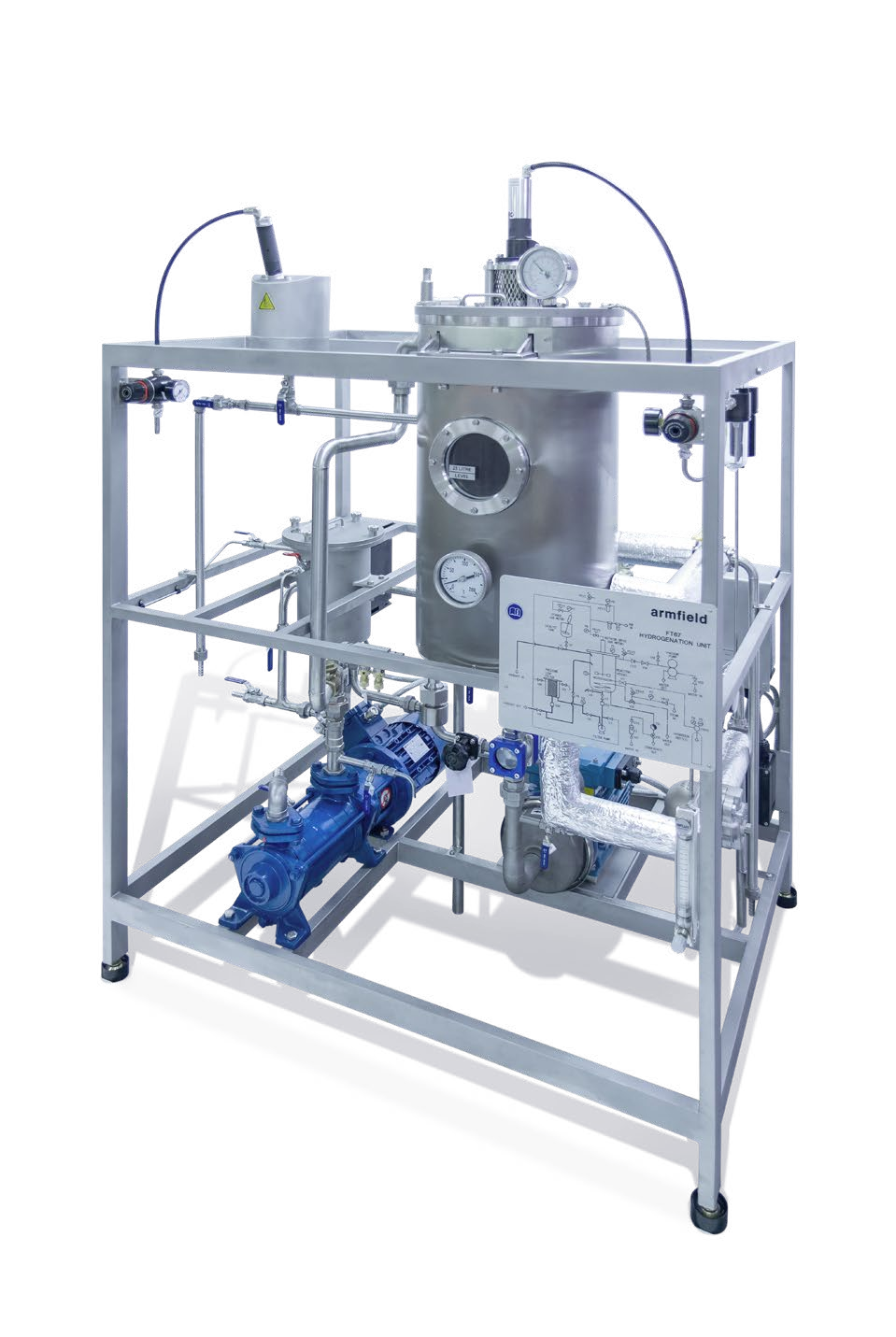Description
The main processing vessel is situated in a floor-standing stainless steel framework, which also houses a catalyst mixing tank, filter pump,
pressure leaf filter and vacuum pump. All equipment in contact with the process fluid is manufactured from stainless steel.
The hydrogenation vessel has a batch capacity of 25 litres.
It is a vertical cylindrical vessel, which incorporates a cooling/steam heating coil, hydrogen gas sparge ring, variable speed turbine agitator and baffle arrangement.
The hydrogen addition cycle results in an exothermic reaction and maintenance of the operating temperature is achieved by
circulating metered cooling water through the submerged cooling coil, which removes the excess heat from the reaction.
Initial heating to the reaction temperature is by steam, also in the immersed coil. A steam pressure control station enables pressures of up to 10.0 bar on the coil so that process temperatures of up to 180˚C can be achieved.
The turbine agitator is driven by a pneumatic motor through a mechanical seal in the lid of the vessel. Rotational speed is varied by adjusting the pressure of the compressed air driving the motor.
A maximum speed of 2500 rpm* can be achieved. The propeller mixer in the catalyst preparation tank is also driven by pneumatic motor and is capable of rotating at speeds up to 850 rpm*. Pneumatics are used
as the motive force as the presence of hydrogen gas requires minimal use of electrical components. Only the filter charge pump and the liquid ring vacuum pump are driven by electric motor.
The centrifugal filter charge pump enables efficient filtering of the catalyst from the oil by the pressure leaf filter, which is a reusable filter requiring no replacement of the filter element. If necessary, filter aid in the form of a diatomaceous earth can be mixed in the catalyst tank and added to the oil charge prior to filtering.
The process vessel and filter are designed fully in accordance with the BS 5500 code for pressure vessels. Vacuum levels of 65 mbar are achieved in the reactor vessel by the liquid ring vacuum pump.
Reduced system pressures are necessary to prevent oxidation during the heating cycle and assist in the removal of any water present in the oil. Also, the suction pressure is used to charge the vessel with oil and for the addition of catalyst and filter aid.
Technical specifications
All electrical equipment used on the unit is scheduled flameproof suitable for use in a zone 1 area, which is an area in which an explosive gas air mixture is likely to occur in normal operation. Due to the use
of hydrogen gas, the Hydrogenation Unit must be installed in an area designated as safe.
Relevant local regulations regarding the operation of this type of equipment must be adhered to.
Hydrogenation vessel
Total volume
25 litres
Cooling/heating coil surface area
0.08m²
Maximum working temperature
180˚C
Normal working pressure
0.7bar and 65mbar
Maximum working pressure
2bar
Agitator drive
pneumatic motor/gearbox
Maximum speed
2500rpm
Catalyst tank
Volume
4.0 litres
Stirrer
pneumatic drive, to 850rpm
Filter pump
Type
centrifugal
Impeller
closed
Capacity
100 l/m @ 2.75 bar
Liquid ring vacuum pump
Capacity
66.0m³/hr
Sealant
water
Sealant flow rate
6.0 l/m
Normal operating pressure
65mbar
Pressure leaf filter
Material
stainless steel
Filter volume
3.8 litres
Filter cake capacity
1.0 litre
Filtering area
0.09m²
Filter screen
110 mesh (0.3mm wire)
Maximum pressure
3.0 bar
Overall dimensions
Length
1.25m
Width
0.95m
Height
1.85m
Packed and crated shipping specifications
Volume
2.5m³
Gross weight
500Kg

 Enquiry:hkmarketing@epc.com.hk
Enquiry:hkmarketing@epc.com.hk 











